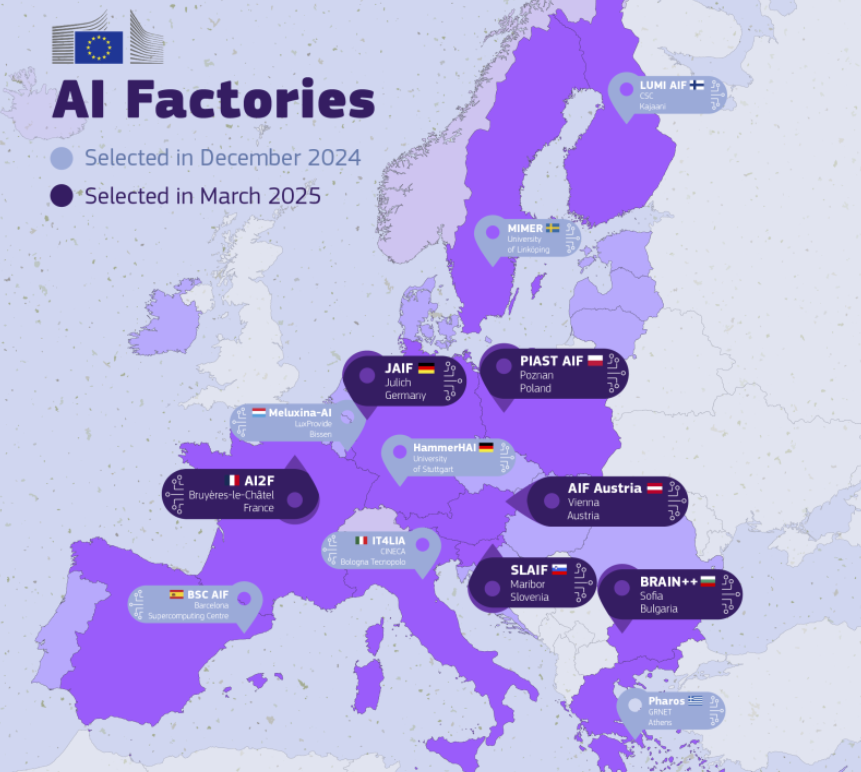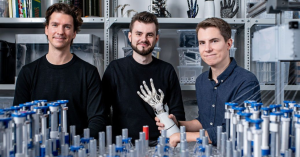Central and Eastern Europe is witnessing significant advancements in AI. At the end of 2024, the European High Performance Computing Joint Undertaking (EuroHPC) selected seven consortia to establish the first AI Factories across Europe, with Greece as the only CEE participant. On March 12th 2025, three additional CEE countries were selected – Bulgaria, Slovenia and Poland.
As part of its ongoing drive to expand Europe’s AI infrastructure, the EuroHPC Joint Undertaking (EuroHPC JU) announced in October four new CEE locations to host the next wave of European AI Factories, which will be launched next year in the Czech Republic, Lithuania, Poland, and Romania.
This initiative represents a combined national and EU investment of approximately €485 million, aiming to accelerate AI research and development within the European Union. The AI factories will deploy new AI-optimized supercomputers and upgrade existing systems.

Bulgaria: €90M BRAIN++ factory at Sofia Tech Park
Bulgaria is set to host one of the upcoming AI factories in Europe. The project, valued at €90 million, is a collaboration between INSAIT (Institute for Computer Science, Artificial Intelligence, and Technology) and Sofia Tech Park.
The Bulgarian AI Factory, named BRAIN++, will be located at Sofia Tech Park and will feature Discoverer++, a next-generation supercomputer optimized for advanced AI workloads.
“Such compute power is important for driving world-class AI research, building foundational models and deploying gen AI at scale, certainly all things that INSAIT is driving heavily,” shared prof. Martin Vechev, founder and scientific director of INSAIT, in a Linkedin post.
BRAIN++ aims to establish Bulgaria as a key hub for AI innovation by assisting startups and small to medium-sized enterprises (SMEs), as well as enhancing AI technologies, including Bulgarian language large language models, robotics AI, space observation AI, and trustworthy AI compliance solutions.
Last year, INSAIT introduced Bulgaria’s first native language LLM, BgGPT.
Czech Republic: CZAI to advance supercomputing integration
The Czech AI Factory (CZAI) will drive the development and uptake of artificial intelligence across Czechia. It will be connected to KarolAIna, a new supercomputer optimised for AI workloads and built upon the EuroHPC petascale system Karolina, hosted and operated by the IT4Innovations National Supercomputing Center. CZAI will prioritise practical applications, advanced technological infrastructure, and skills development, strengthening the integration of the Czech AI ecosystem within the European network of AI Factories and other initiatives under the AI Continent framework.
The consortium is coordinated by VSB, Technical University of Ostrava, in partnership with Brno University of Technology, Charles University, the Czech Technical University in Prague, the International Neurodegenerative Disorders Research Center, and the Institute of Organic Chemistry and Biochemistry. CZAI is intended to serve Czech and European industrial, academic, and public AI stakeholders.
Lithuania: LitAI Factory advancing AI infrastructure
The LitAI Factory seeks to evolve Lithuania’s high-performance computing (HPC) capacity into a sovereign, AI-optimised infrastructure capable of supporting both national priorities and European objectives. Led by Vilnius University, the project will be based at the upgrade-ready LRTC VDC3 data centre in Vilnius, ensuring a robust and high-quality platform.
The consortium brings together Vilnius University (VU), Kaunas University of Technology (KTU), Vilnius Gediminas Technical University (VILNIUS TECH), Vytautas Magnus University (VMU), the State Data Agency (SDA), SC Lithuanian Radio and Television Centre (LRTC), the Innovation Agency (IA), and other associated partners.
Through strengthened cooperation with Polish HPC and quantum centres and broader engagement with EU-level initiatives, the LitAI Factory aims to establish Lithuania as a dynamic contributor to the European AI ecosystem.
Poland: Collaborative project for PIAST-AI center
In Poland, the PIAST-AI center will be managed by the Poznań Supercomputing and Networking Center, Poznan University of Technology, and Adam Mickiewicz University. The center will concentrate on sectors such as healthcare, cybersecurity, agriculture, and space technologies.
The PSNC-led Consortium called PIAST AI includes Adam Mickiewicz University, Poznan, jointly with Poznan University of Technology and Nicolaus Copernicus University in Torun.
Poland: Developing the Gaia AI Factory
The Gaia AI Factory initiative aims to accelerate the development and adoption of advanced AI technologies across Poland. It encompasses the expansion of high-performance infrastructure, improved access to extensive data repositories, and the enhancement of AI-related skills and competencies through diverse training, advisory services, and talent development programmes. Key focus areas include healthcare, space technologies, and large language models (LLMs).
The project is designed to support entrepreneurs, students, researchers, and public administration representatives at all stages of AI maturity, offering assistance throughout the entire AI lifecycle.
The Gaia AI Factory will be deployed and operated by Cyfronet AGH as part of the PLGrid infrastructure, with consortium partners representing all regions of Poland. In collaboration with the PIAST and LUMI AI Factories, Gaia aims to help build a cohesive and integrated AI ecosystem across Central Europe.
Romania: National initiative for RO AI Factory
The RO AI Factory seeks to empower small and medium-sized enterprises (SMEs) to evolve from passive technology users into active AI innovators by focusing on service provision, training, and access to advanced infrastructure.
Based in Bucharest, the RO AI Factory will be hosted and jointly coordinated by the National Institute for Research & Development in Informatics – ICI Bucharest and the University Politehnica of Bucharest (UPB). The consortium also includes the Technical University of Cluj-Napoca (UTCN), the National Institute of Research and Development for Biological Sciences (INCDSB), the Transilvania IT Association (ATIT), the Research Institute for Artificial Intelligence (ICIA), the National Council of Small and Medium Sized Private Enterprises in Romania (CNIPMMR), and the Association of Romanian Digital Innovation Hubs (RoDIH).
The initiative plans to acquire and operate an AI-optimised supercomputer and offer a comprehensive range of AI-enabling services, including HPC access, AI model development and training, data space hosting, algorithm libraries, and tools promoting responsible and trustworthy AI. Through this integrated service model, the RO AI Factory will enable a wide spectrum of Romanian and European stakeholders to actively engage with, contribute to, and benefit from the national AI ecosystem.
Slovenia: SLAIF at the Institute of Information Sciences
The Slovenian AI factory, SLAIF, aims to equip businesses and the public sector with AI tools to enhance competitiveness, improve services, and benefit society.
The facility, based at the Institute of Information Sciences (IZUM) in Maribor, will feature an AI-optimized supercomputing infrastructure. It is designed to support industrial AI applications, train large-scale AI models, and facilitate AI-driven scientific research.
IZUM will oversee the project in collaboration with a consortium that includes the Jožef Stefan Institute, the ARNES academic and research network, several Slovenian universities, the Ljubljana Technology Park, and the Slovenian Chamber of Commerce.
Greece: Pharos, Greece’s new AI factory
The Greek AI factory will focus on supporting national and European AI applications in healthcare, culture and language, and sustainability, including energy, environment, and climate. It will aim to provide comprehensive user support, from skill development and data access to AI model training and business innovation.
Pharos is led by a consortium that includes the National Centre for Scientific Research “Demokritos,” the Athena Research Center, the National Technical University of Athens, and the National Fund of Greece.
What’s next?
By 2026, these AI Factories are aiming to be the backbone of Europe’s AI strategy, combining computing power, data, and talent to drive innovation and secure Europe’s leadership in AI.








